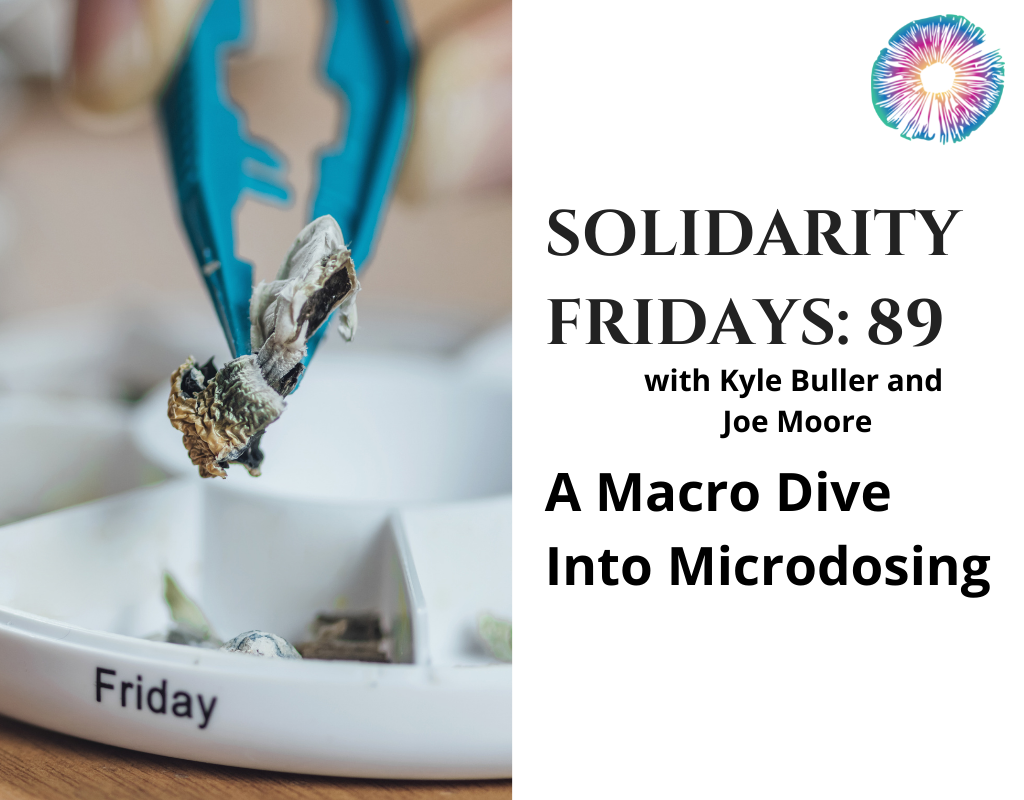
In this week’s Solidarity Fridays episode, Joe and Kyle sit down for an old fashioned freestyle session, taking a macro dive into microdosing.
Inspired by their conversation with James Fadiman from a few weeks ago, they discuss all things microdosing: Why people are doing it, what they’re using, possible negative effects, how it could work with pain (pain management and/or neurogenesis), what other indications it could help, how research studies are pretty limited (yet very polarizing), how other life variables are likely at play when microdosing, and how the classic self-blinding study that many deemed the death knell for microdosing should actually be seen as the beginning of a long road of research.
Joe then shares an Instagram post from author Kelly Starrett that sarcastically showcases the problems with physical therapy in a careless healthcare system, which leads to a conversation about how one decides what a good outcome is in mental health therapy: What are the patient’s goals and how do they differ from those of the therapist (or insurer)? How do you measure progress? Can we avoid a model of “therapy forever”? And they discuss the problems with self-scoring, high cocaine use being linked to strokes, the coaching industry, chronic pain, Star Trek, and reconsidering the use of the word, “overdose.”
Notable Quotes
“This thing needs to be a long conversation. This isn’t one study and done because [Balázs Szigeti and David Erritzoe] did that self-blinded, self-reported study with a lot of samples. That’s not the end of the story. That’s the beginning of the story.” -Joe
“It would be interesting to get some data around somebody’s day. How are they actually creating their day? Are they starting off with an intention that this is going to help them? [Are] they putting a lot of value on it? Are they doing any meditation once they take their microdose? Are they engaging in any sort of ritual? Anything to enhance that? …What type of role do those other extracurricular activities play in enhancing wellbeing? …Is it the microdosing or is it actually the whole day and the activities that you’re engaging in and your mindset around: ‘This is going to be helpful for me’?” -Kyle
“I think we have to thank microdosing quite a bit for where we are in psychedelics today (no pun intended).” -Joe
“Don’t just shut the door on microdosing. Understand [this] thing is really complex and we don’t know much yet. But some people? It’s fucking saving their lives.” -Joe
Links
UBCO study finds psychedelic microdosing improves mental health
TheLancet.com: Development of a rational scale to assess the harm of drugs of potential misuse
David Nutt’s Drug harm ranking scale (Alcohol is actually #5, Joe)
Chacruna.net: Why Chronic Microdosing Might Break Your Heart
Microdosinginstitute.com: Microdosing Protocols
Algernonpharmaceuticals.com: DMT- Stroke Program
Flowers for Algernon, by Daniel Keyes (you were so close, Joe!)
NCBI.gov: Cocaine use and stroke
@thereadystate’s post on Instagram
Psychedelics Today: Peter Hendricks Ph.D. – Psilocybin for Cocaine Use
Support the show!
- Patreon
- Leave us a review on Facebook or iTunes
- Share us with your friends
- Join our Facebook group – Psychedelics Today group – Find the others and create community.
Navigating Psychedelics




